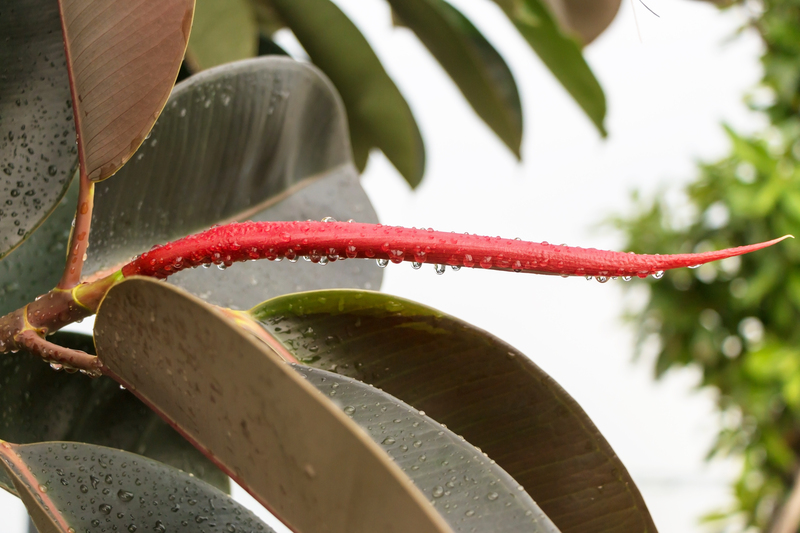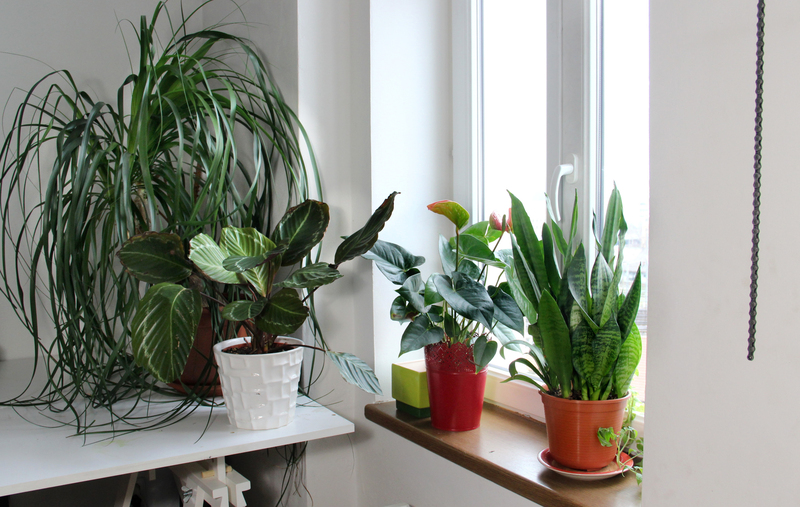Revamping Organic Waste into Soil Boosters
Posted on 18/08/2025
Revamping Organic Waste into Soil Boosters: A Comprehensive Guide
In an age where sustainability and environmental stewardship are increasingly important, the way we manage organic waste plays a pivotal role. Revamping organic waste into soil boosters not only reduces landfill contribution but also enriches our soils, promoting healthier gardens, farms, and landscapes. This comprehensive article explores innovative strategies and practical methods for transforming organic matter into robust enhancers for soil health.

What is Organic Waste?
Organic waste refers to biodegradable material originating from plants or animals. Common examples include:
- Food scraps (fruit peels, vegetable trimmings, coffee grounds, eggshells)
- Yard waste (fallen leaves, grass clippings, pruned branches)
- Paper products (unbleached paper towels, cardboard)
- Animal manure
Unlike synthetic or inorganic materials, organic waste can decompose naturally, releasing valuable nutrients back into the ecosystem when managed correctly.
Why Convert Organic Waste into Soil Boosters?
Transforming waste into soil boosters has multiple environmental and economic benefits:
- Reduces landfill overflow: By diverting biodegradable waste from landfills, we cut down on methane emissions--a potent greenhouse gas.
- Improves soil fertility: Compost and other organic amendments release essential nutrients, improving soil structure and fertility.
- Supports healthy plant growth: Organic matter in the soil boosts water retention, encourages beneficial microorganisms, and enhances root development.
- Decreases chemical dependency: By recycling nutrients naturally, the need for synthetic fertilizers is dramatically reduced.
- Promotes a circular economy: Utilizing organic residuals locally fosters sustainable community practices.
The Science Behind Organic Waste Transformation
The process of revamping organic waste into soil fertility boosters centers around decomposition. Microorganisms such as bacteria, fungi, earthworms, and beetles break down complex organic materials into simpler substances, chiefly humus. Humus is a rich, dark, crumbly substance that enhances soil health, increases nutrient availability, and supports vibrant plant life.
The main processes include:
- Composting: Controlled aerobic decomposition
- Vermicomposting: Utilization of earthworms to expedite decomposition
- Bokashi: Anaerobic fermentation using beneficial microbes
- Biochar production: Charring organic waste to sequester carbon and improve soil
Understanding Soil Boosters
Soil boosters are products or materials that increase the soil's nutrient content, moisture retention, and microbial activity. These can include:
- Compost
- Mulch
- Manure-based fertilizers
- Biochar
Integrating organic waste into these products transforms what was once worthless trash into a vital resource.
Composting: The Most Popular Soil Booster Transformation
Step-by-Step Guide to Composting
- Select a Composting Site: Choose a shaded, well-drained spot in your backyard or use an indoor composting bin for smaller spaces.
- Build a Compost Pile: Layer green materials (high in nitrogen) like kitchen scraps, with brown materials (high in carbon) such as leaves or newspaper.
- Maintain Moisture: Keep the pile as damp as a wrung-out sponge.
- Turn the Pile: Aerate every few weeks to supply oxygen and speed up decomposition.
- Wait and Use: In a few months, the compost should be dark, earthy-smelling, and ready to enrich your garden.
What Can and Can't Be Composted?
- Compostable: Fruit and vegetable scraps, tea bags, coffee grounds, cardboard, sawdust, lawn clippings
- Do Not Compost: Meat, dairy, oils, diseased plants, synthetic materials
Vermicomposting: Harnessing Worm Power
Vermicomposting is the process of using red wiggler worms (Eisenia fetida) to convert organic waste into highly potent soil boosters called worm castings. These castings are rich in beneficial microbes and nutrients and can be directly mixed into plant beds or pots.
Why Use Vermicomposting?
- Rapid Waste Break Down: Worms digest food waste quickly and efficiently.
- Odorless: Properly managed bins emit minimal odor compared to traditional compost piles.
- Space-saving: Suitable for indoor or balcony use.
- Produces Liquid Fertilizer: "Worm tea" can be drained off and used as a nutrient-rich liquid feed for plants.
Advanced Soil-Enhancing Techniques
Bokashi: Fermented Organic Waste
Bokashi composting is an anaerobic process that uses a specific blend of microbes to ferment organic matter. Unlike traditional composting, bokashi can handle items like cooked food, dairy, and small bones. The fermented result can be directly buried in soil, where it breaks down rapidly and releases nutrients.
Biochar: Charred Organic Matter for Soil Health
Biochar is created by burning organic waste in a low-oxygen environment. The resulting charcoal-like substance is added to soils to improve water retention, sequester carbon, and foster microbial activity. The process not only recycles organic material but also helps mitigate climate change by locking carbon in the soil for centuries.
Practical Tips for Home Gardeners
- Start Small: Even a simple kitchen compost bin reduces food waste and produces quality fertilizer for indoor plants.
- Layer Materials: Alternate between green (nitrogen-rich) and brown (carbon-rich) materials for optimal decomposition.
- Balance Moisture: Too wet or too dry slows the composting process--aim for damp, not soggy.
- Mash Large Pieces: Chop up twigs, stems, and peels to encourage faster breakdown.
- Use Finished Compost: Apply as a top dressing, mix into potting soil, or brew 'compost tea' for liquid feeding.
Community and Commercial Organic Waste Remediation
Urban areas and agricultural producers are increasingly investing in large-scale solutions to repurpose organic waste into soil boosters:
- Municipal Composting Programs: Cities collect food and yard waste curbside, transforming tons of organic garbage into high-grade compost for parks, roadsides, and residents.
- On-Farm Composting: Farmers recycle crop residue and animal manure, improving soil fertility and reducing external input costs.
- Industrial Vermicomposting: Enterprises produce worm castings at scale for landscaping and horticulture markets.
- Biogas Plants: Facilities convert organic waste into renewable energy while delivering nutrient-rich digestate for soil.
Innovative Approaches to Soil Amendment from Organic Waste
- Compost Tea: A liquid extracted from mature compost, compost tea can be sprayed on foliage or soil, delivering beneficial microbes and nutrients.
- Mulching: Applying a layer of shredded organic waste directly to soil suppresses weeds, conserves moisture, and slowly feeds plants as it decomposes.
- Biofertilizers: Specialized blends of microbial cultures derived from composted material enhance nutrient cycling and plant resilience.
- Enriched Topsoil Mixes: Commercial blends incorporate various types of decomposed organic waste, providing custom solutions for landscaping, gardening, or agriculture.
The Environmental Impact of Organic Waste Upcycling
Diverting organic waste from landfills and instead upgrading it into soil boosters has significant effects:
- Decreases landfill methane emissions, a major contributor to global warming.
- Conserves landfill space for non-compostable waste.
- Restores degraded soils and supports sustainable food production.
- Reduces runoff and pollution linked to chemical fertilizer use.
- Supports biodiversity by attracting soil life and beneficial insects.
Sustainable Cities and Zero-Waste Initiatives
Many cities worldwide are moving towards zero-waste goals by integrating comprehensive composting mandates and incentivizing both households and businesses to contribute. Soil-boosting outputs from these programs are then reinvested locally for urban agriculture, forestry, and landscaping.
Challenges in Revamping Organic Waste
While recycling organic waste into soil amendments offers clear benefits, several barriers remain:
- Contamination: Plastics, metals, and chemicals often mix with food and yard waste, complicating processing.
- Awareness: Lack of public education leads to improper waste segregation and low participation rates.
- Infrastructure: Some communities lack collection services and processing facilities for organic waste.
- Regulatory Hurdles: Quality standards and safety regulations can limit distribution and application of compost products.
However, with advances in technology, policy, and public awareness, these challenges are steadily being addressed.
Looking Ahead: The Future of Soil Boosters from Organic Waste
As society becomes more climate-conscious, the upcycling of organic waste into innovative soil enhancers will become ever more crucial. Research is opening up new frontiers--from microbial inoculants tailored to specific crops, to smart sensors optimizing on-farm composting in real-time, to community-based urban farming fed by localized waste streams.
Revamping organic waste into soil boosters is more than a trend--it's a cornerstone of responsible resource management. By closing the loop and returning nutrients full circle, we build healthier soils, stronger communities, and a more resilient planet.

Get Started: Transform Waste into Abundance
- Begin Composting: Set up a bin and start collecting food scraps and yard waste.
- Support Community Programs: Participate in local organics collection or volunteer at a communal garden.
- Share Your Success: Educate neighbors and friends about the benefits of soil-boosting organic waste recycling.
- Innovate: Experiment with vermicomposting, bokashi, or small-scale biochar to find what works best.
Every banana peel, coffee ground, and pile of leaves has the potential to become black gold for your soil. Join the movement towards a greener, richer, and more sustainable future--one compost pile at a time.
Frequently Asked Questions on Revamping Organic Waste into Soil Boosters
- Q: How long does it take for organic waste to become usable compost?
A: Properly managed compost piles can produce usable soil boosters in as little as 2-4 months. - Q: Is there a risk of disease from using composted household waste?
A: Finished compost, if properly processed, is safe for gardens. Avoid composting pet waste or diseased plants to eliminate risks. - Q: Can I compost in an apartment?
A: Yes! Vermicomposting bins and bokashi buckets are designed for small spaces and virtually odor-free operation.
Conclusion: Empowering Soil, Empowering the Planet
Revamping organic waste into soil boosters is a powerful, accessible way to foster environmental change and personal abundance. Whether you're a seasoned grower, a mindful homeowner, or a community leader, investing in organic waste recycling is a step towards healthier soils, flourishing plants, and a thriving Earth.
Ready to contribute? Start today and watch your waste become tomorrow's bounty!
Latest Posts
Innovative Approaches to Guarding Gardens from Winds
Nurture Kids' Growth with a Fun Garden Design
Unlock the potential of your UK garden with 9 ground covers



